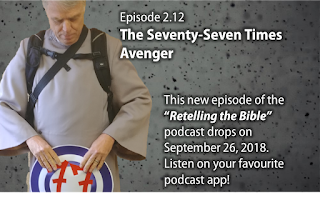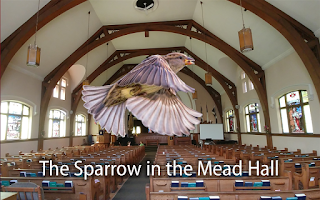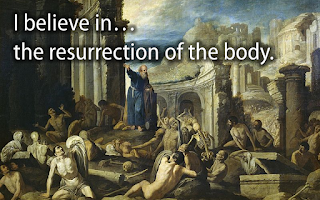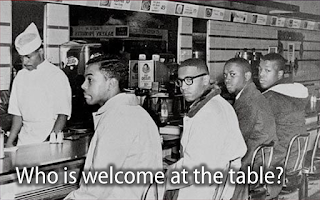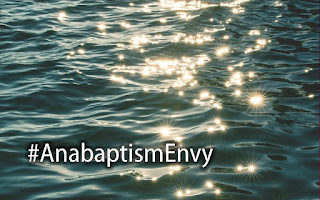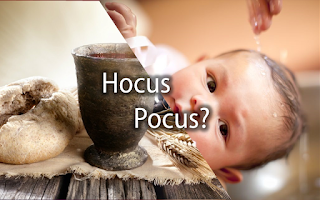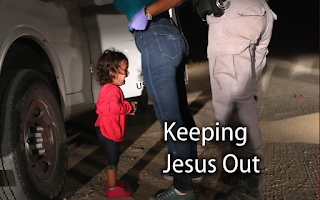I am very grateful for the opportunity that was given to me this past spring to take a ten-week intermission from my duties at St. Andrew’s.
I have been a full-time minister in the Presbyterian Church in Canada, now for 26 years. That means that for over a quarter century (and a very large portion of my life) all of my work and all of my professional efforts have been directed toward the maintenance and promotion of that particular institution. All I have done, most everything I have engaged in, has all been done with one underlying assumption: this has to be good for and helpful to the church.
 I don’t complain about that – it is what I signed up for after all – but I do note that, when you look at the world from that one point of view for such a long time, it begins to limit your perspective. I believe that I needed a new perspective on the work that I do and that was not going to be possible without taking an extended period of time away from the church to get the church out of my head.
I don’t complain about that – it is what I signed up for after all – but I do note that, when you look at the world from that one point of view for such a long time, it begins to limit your perspective. I believe that I needed a new perspective on the work that I do and that was not going to be possible without taking an extended period of time away from the church to get the church out of my head.And so, for example, I felt that it was important that I take the first several weeks of my intermission to completely avoid any thought of the Christian church. I did not attend any worship services. I did not read any the news from the church or anything else related to the work of the church. I simply avoided it entirely.
I know, I realize that this is something that many Christians do all the time without even thinking about it, but it is literally something that I had not been able to do for years and I do believe that it helped me to gain new perspective on the church and its life.
In fact, I was kind of amazed at how easy it was to put the church completely out of my mind and out of my life. That is exactly how the vast majority of people in our society today live – without sparing a moment’s thought for the church and its needs.
And the first thing I realized is that I don’t think that they are missing it. Oh, I am quite sure that there are many people who are suffering, needlessly, because they lack the knowledge of the good news of God’s grace, forgiveness, power and strength. Even more important, they are missing out on the opportunity of living out that grace and truth in an active community, whether they realize it or not.
But I didn’t miss, and I expect that most people don’t miss, the things that we tend to spend so much of our energy on in the life of the church. They don’t miss the pressure to conform to other people’s ideas of what it means to be a Christian. They don’t miss the worrying about the loss of traditions or the resistance to change. They don’t miss all of the worries about institutional maintenance. It makes me wonder whether sometimes we are just spending too much of ourselves in the church on the things that matter least.
But, even as I spent time away from the church, I felt the importance of my faith. I continue to love and to cherish the Bible which, for me, is the source of so much that is good. I think that one of our problems is that the church has tried to keep the Bible to itself – to use the Bible only to serve its own needs and its own purposes. I felt the need to free the Bible from the church to bring it closer to those people who do not feel as if they belong in the church. That is one big reason why, during my intermission, I spent a fair bit of time working on a project trying to bring the Bible (in particular the stories of the Bible) to people outside of the church. I created a podcast called “Retelling the Bible,” in which I retold some of the great stories of the Bible without worrying about whether or not the way I was telling the story would be completely acceptable to the church. I just enjoyed the stories of the Bible as I saw them without worrying about whether my interpretation might be judged wrong by some Christian institution somewhere. I greatly enjoyed being able to approach the Bible with such freedom and I think it brought something valuable to me, something that I have been able to share with others and I will continue to do that as I continue to publish, now on a monthly basis, my podcast. You can find out more about the podcast and find out how to subscribe at retellingthebible.wordpress.com.
Having spent several weeks away from the life of the church, I finally felt that it was time for me to re-approach the church, but this time as an outsider. I spent the next several weeks of my intermission visiting churches. This is something that I have almost never been able to do in my life. I have never come to a church as an outsider. And I wanted to share with you some of the things that I learned by doing so.
First and most importantly of all, I very quickly realized how difficult it is to do such a thing. I did not find it easy at all to approach a church where I didn’t really know anyone and didn’t really, at least initially, want to know anyone. I just wanted to go and see what it was like and it was extremely hard even to walk through the door each time. Some of this was for some very practical reasons. I wasn’t used to how things are done there or even where to go. In one case, I walked in a door and immediately got lost, took a wrong turn, and then ended up walking out a back door by the river and almost too embarrassed to try to go in again. These kinds of experiences underlined to me just how hard it is for people who haven’t been to church in a long time (or maybe not ever) to actually show up when the church is open.
I observe that churches often seem to operate under one big assumption. We assume that, if we can put on a good program – if we have an excellent worship service or music program or children’s program or whatever it may be – that people will just come. I call it the “Field of Dreams” assumption: “If you build it, they will come.” That may have once worked, but my experiences have shown me that it doesn’t anymore. When new people show up among us on their own, I hope you recognize that it was probably not easy for them to do so at all. And I hope that you realize that there are many more people who simply will not come on their own. Many studies show that the only way that most people will come to a new church is if they are not only personally invited but also actually accompanied through the door. This is something that we all need to be thinking about as we work on church life and growth.
There was another thing that I noted in my visits. I noted that when congregations were at their most formal – when they were sticklers for their own forms and traditions – was when I usually felt most uncomfortable and out of place. It was when (either intentionally or unintentionally) that formality broke down that I felt most welcome and started to enjoy myself. This made me realize that formality in churches is something that we mostly do to please those who have been there the longest. Longtime members are most comfortable when everything happens formally but a strong and growing church cannot exist only for insiders. Informality (whether planned or not) often gives visitors the message that we are not hung up with ourselves and that we are comfortable enough with who we are to laugh, make mistakes and forgive each other with love. Just something to think about.
